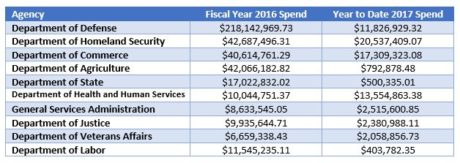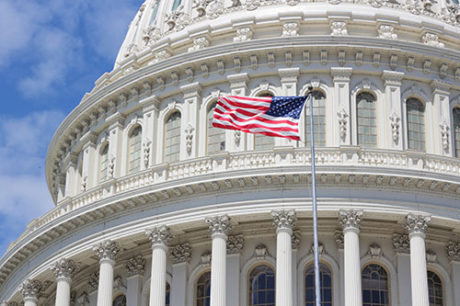
This week we’re going to focus on who and how you should be marketing to the federal government. An agencies past performance can be a good indicator of future needs, so we will also take a look at some agencies’ spending patterns related to the Women-Owned Small Businesses (WOSBs) and Economically Disadvantaged Women-Owned Small Businesses (EDWOSBs) programs.
Who?
The Small Business Act requires that government agencies strive to allocate 5% of their annual spending to Small Businesses owned and controlled by women. Since the 5% is a goal, the application across agencies varies considerably. Below is a list of the agencies who allocated the most procurement dollars with WOSBs in Fiscal Year 2016 and so far in 2017. The dollar amounts shown in the chart are the total sales with WOSBs alone. A great ice breaker for WOSBs who meet agencies on the list below could be, “I saw that you all were a strong supporter of WOSBs last year, ranking among the top 10 agencies. Since your agency has had considerable success with this program in the past let me tell you about the products/ services my WOSB offers.” You could get even savvier by reviewing an agency’s budget or past opportunities on USA Spending.

How?
There are several essential tools every government contractor should have. WOSBs should not only have these tools, but they should customize them to highlight the advantages of being a WOSB or EDWOSB.
- Government webpage on website. Government agencies look contractors up just like contractors look vendors up. They will visit your webpage, so having a dedicated government webpage that succinctly summarizes your products and/ or services is extremely important. You should include additional information about the applicable NAICS codes to your business, your differentiators, and past performance to name a few. Lastly, and most importantly as a WOSB, you should advertise this throughout your webpage. You could even go so far as to mention the Sole Source advantage granted to WOSBs and EDWOSBs in 2015, refer to the blog in paragraph one for more info.
- Capabilities Statement. A capabilities statement is a 1-2 page document that you can use as marketing collateral at events or meeting that gives agencies a quick overview about your company. The important information on a capabilities statement is similar to your webpage, but the difference here is that you should customize this document for your audience. For example, if you are going to a meeting with a DOD bureau you should highlight any past performance you have with the DOD and highlight capabilities directly related to the opportunity you are going to discuss.
- Attend events. In this climate where it seems like you are always hearing lowest price technically acceptable (LPTA), make sure you don’t lose sight of the value of a face to face meeting. It is true that cost is a major factor in determining contract awards, but getting the chance to discuss the advantage your company has over similar organizations can help the procuring agency justify a higher cost award for a better solution.
- GSA Schedule. The GSA Schedule is one of the most utilized contract vehicles by the federal government. Really, this last bullet could just say contract vehicles because there are hundreds that different agencies use. While most organizations would view a GSA Schedule as a sales tool, I also see it also as a marketing Being a GSA Schedule holder announces to purchasing agencies that you are an experienced contractor with a pre-vetted pricelist ready to do business. To learn more about how a GSA Schedule can increase your visibility check out our 5 W’s of GSA Schedules: Who, What, Where, When and Why blog.
These are just a few basic tools for marketing yourself to the federal government. As we enter the federal government’s third quarter next month, keep in mind that this is the time to get in front of agencies and put your time and resources into responding to opportunities. This will lead you to having a strong pipeline for the fourth quarter.
 Like
Like








0 responses on "Women in Business: Making Cents of Government Marketing"